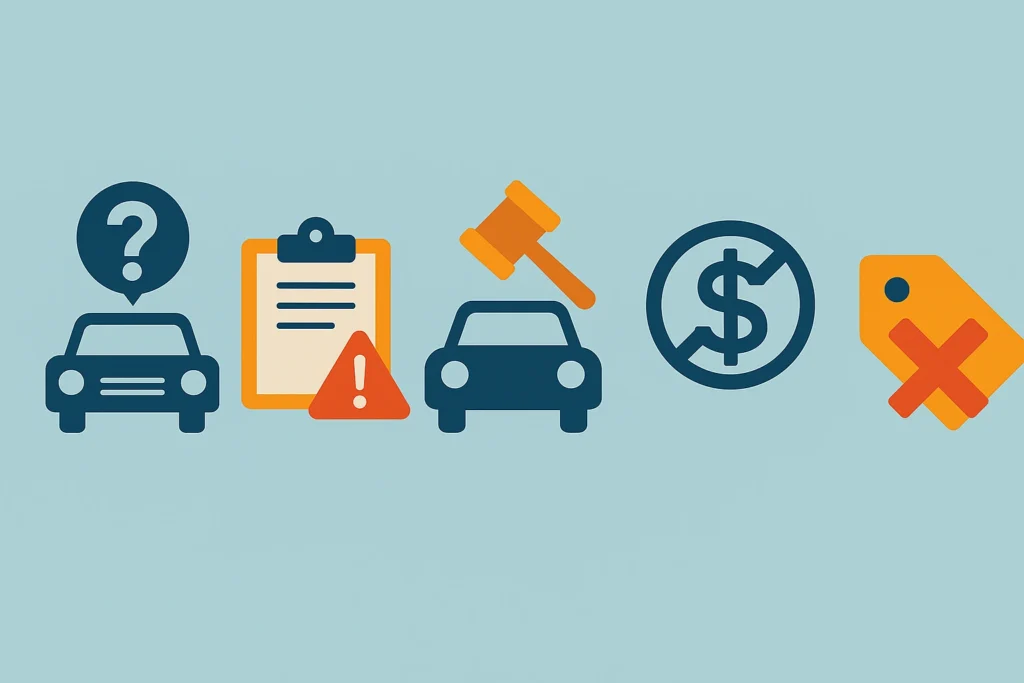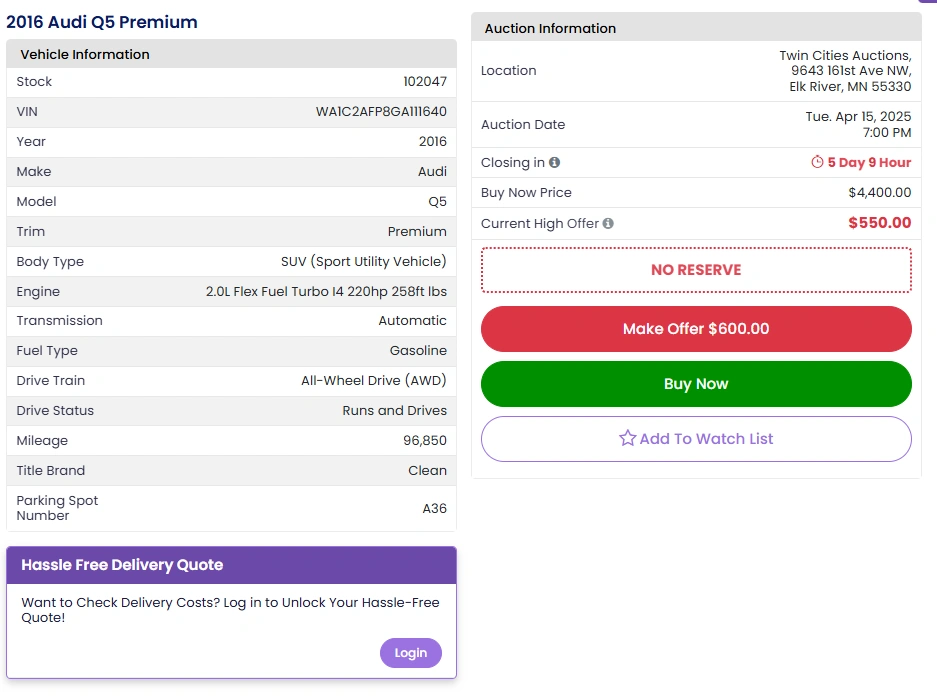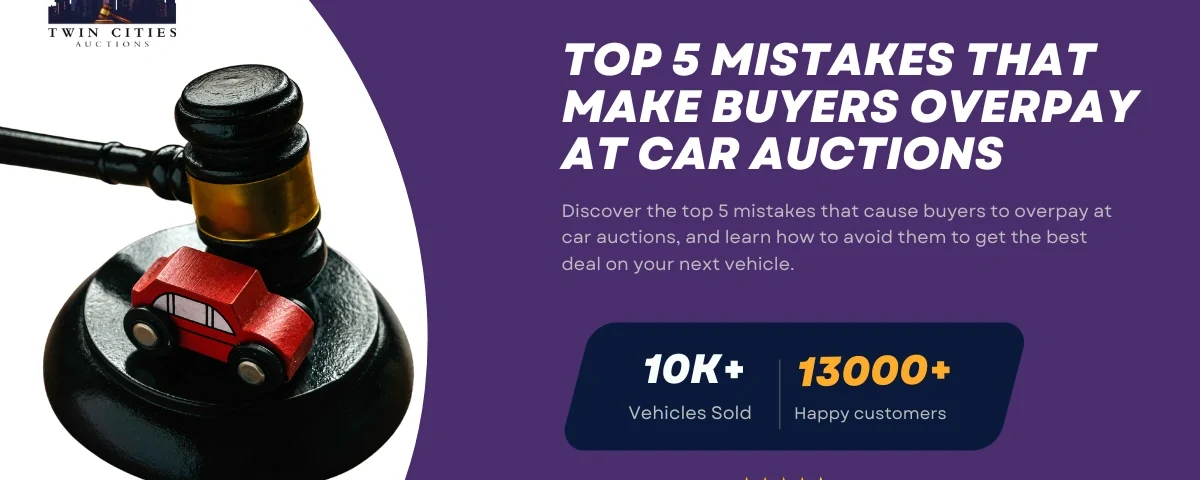Car auctions, whether held in massive yards or online platforms like Twin Cities Auctions, offer the chance to score exceptional deals on late-model vehicles. But without thorough preparation, it’s all too easy for buyers to overbid, overlook hidden costs, or discover unexpected damage after the sale.
From surprise fees and auction adrenaline to incomplete research and logistics snafus, buyers can sink thousands over fair market value.
This guide unpacks the five most common overpaying mistakes and gives buyers detailed, actionable strategies to bid confidently, control your costs, and drive home the best deal at any auction.

Key Takeaways
- Always inspect vehicles in person or hire a qualified mechanic to uncover hidden issues not listed in condition reports.
- Include buyer’s premiums, reconditioning, title, registration, transport, and taxes in your total cost calculations to avoid surprises.
- Determine your maximum bid beforehand and resist the urge to exceed it during the excitement of bidding.
- Use multiple sources like Kelley Blue Book, NADA Guides, and Edmunds to understand fair market prices for the vehicles you’re interested in.
- Ensure you have payment methods and transportation arranged before the auction to prevent delays and additional costs.
- Choose Reputable Auction Houses: Opt for auctions that offer transparent grading systems and clearly published fee schedules to ensure a trustworthy buying experience.
Mistake 1: Skipping the Pre-Auction Inspection
Why it matters: Condition reports can miss hidden issues—frame damage, leaking seals, electrical faults, or previous flood exposure—that cost thousands to repair.
How to avoid:
- Study the condition report for notes on suspension, drivetrain, and body damage.
- Inspect critical systems in person—engine, transmission shifts, brake performance.
- Check underbody and fluids for rust or leaks.
- Arrange a third-party pre-purchase inspection by a qualified mechanic.
- Verify title branding via NMVTIS or VINCheck to uncover salvage or flood history.
Mistake 2: Ignoring Hidden Fees
Why it matters: Auctions charge buyer’s premiums, recon fees, document fees, title/registration, and transport—often adding 10–20% to your hammer price.
How to avoid:
- Obtain the full fee schedule (e.g., ACV Auctions’ buyer’s premiums range $100–$385)
- Calculate total landed cost: hammer price + buyer’s premium + recon + title/registration + transport
- Include sales tax on the complete purchase price, as required by your state
- Allocate a contingency of 5–10% for unexpected administrative or storage fees
Mistake 3: Bidding Emotionally
Why it matters: “Shadow bidding” driven by auction thrill can push you beyond your budget without realizing it.
How to avoid:
- Set a firm maximum bid based on your total landed cost calculations and stick to it.
- Use absentee or proxy bidding to enforce discipline and avoid live-pressure mistakes.
- Pause between lots—take a minute to reassess before bidding again.
- Track your spending with a simple log comparing hammer prices against your cap.
- Bring a trusted partner to call “timeout” if you stray.
Mistake 4: Failing to Do Market Research
Why it matters: Without comparable data, you’ll lack perspective on what constitutes fair value for the year/make/model/mileage.
How to avoid:
- Consult multiple guides—Kelley Blue Book, NADA Guides, and Edmunds—for retail and wholesale ranges
- Review recent auction results for similar vehicles on the same platform
- Check local dealer listings to understand regional market premiums
- Adjust for regional demand—urban vs. rural, seasonal trends, specialty vehicle markets
Mistake 5: No Exit Strategy
Why it matters: Post-auction logistics—payment, transport, storage—can incur fees or force rushed decisions at a loss.
How to avoid:
- Confirm payment method: Buyers should have financing approval, cashier’s check, or wire-transfer ready.
- Pre-book transport or towing: schedule pick-up within the auction’s removal window.
- Know storage policies: understand fees for late removal (typically assessed daily).
- Plan walk-away conditions: be ready to forfeit any deposit if costs exceed your limit.
Understanding Title Brands and Vehicle History
Title brands like salvage or rebuilt carry legal and financial implications:
- Salvage: Declared total loss; sold “as-is,” often requiring extensive repairs.
- Rebuilt: Repaired to pass a state inspection; registerable but may have limited resale.
Always run the VIN through NMVTIS or VINCheck, review inspection certificates for rebuilt cars, and budget for any necessary retitling or additional inspections.
Why Auctions Are a Smart Choice for Car Purchases
Auctions can be an excellent source for late-model vehicles with clear chains of title and affordable pricing. Twin Cities Auctions, based in Minnesota, is one such reputable auction house that offers a wide range of vehicles at competitive prices.
Key Benefits of Buying from Auctions:
- Wide Selection: Auctions like Twin Cities Auctions offer a variety of vehicles, from low-budget cars to high-end models.

- Competitive Pricing: Auctions often offer vehicles at prices below retail value, enabling dealers to maximize their profit margins.

- Transparency: Auctions provide full vehicle history reports, so you know exactly what you’re buying.

- Convenient Bidding: Many auctions offer online bidding for your convenience, making it easier to source vehicles without being physically present.
Twin Cities Auctions: A Smart Vehicle Sourcing Choice
For those in the automotive industry, Twin Cities Auctions offers an excellent platform for sourcing quality vehicles at competitive prices.
Whether you are just starting or expanding your business, this auction house provides transparency, competitive pricing, and a broad selection.
| Feature | Description |
| Inventory Variety | Wide range of cars, trucks, and SUVs available |
| Competitive Pricing | Below-market pricing allows for higher profit margins |
| Vehicle History Reports | Detailed history reports for every vehicle |
| Online Bidding | Convenient online bidding options for dealers |
| Financing Options | Financing available to help with inventory purchases |
Conclusion
Auctions can deliver exceptional value, but without preparation you risk overpaying through hidden fees, emotional bidding, or overlooked damage.
By inspecting vehicles firsthand or via a trusted mechanic, including every fee in your maximum bid, and researching true market values, you’ll bid with confidence rather than impulse.
Set firm spending limits, plan payment and logistics in advance, and verify title brands through NMVTIS or VINCheck to avoid nasty surprises.
Choosing reputable venues like Twin Cities Auctions—with transparent grading, flat fees, and same‑day title processing—further safeguards your purchase. Follow these strategies to control costs and drive home the best deal every time.
Ready to Buy or Sell Your Car? No Dealer License Needed!
At Twin Cities Auctions, we simplify the process of buying and selling vehicles, making it straightforward and hassle-free. You don’t need a dealer license to participate—our online platform is open to the public, accommodating both first-time buyers and seasoned sellers.
Whether you’re upgrading your ride or selling your current vehicle, we provide the platform you need that offers a diverse range of vehicles and a transparent bidding process. Start your auction journey with us today!
Looking for more options? Explore our comprehensive list of all available car auctions across the United States. Your next deal might be just a click away!
FAQ
What is a buyers premium?
A fee charged by the auction house on top of the hammer price, typically a flat rate or percentage based on the final bid.
Can I inspect cars before the sale?
Yes—most auctions offer preview days, and you can often hire third-party inspectors for a detailed pre-purchase evaluation.
How do I calculate my max bid?
Add the hammer price, buyer’s premium, transport, reconditioning, title/registration fees, and applicable sales tax to set your total budget.
Are auction fees always published upfront?
Reputable auction platforms publish their fee schedules—review these online or in the bidder’s guide before bidding.
When should I walk away?
Buyers should decide on a firm total-cost limit prior to bidding; pause or exit if any lot’s projected expenses exceed that cap.
What is a condition report?
A standardized document from the auction that categorizes damage, mechanical status, and title brand information.
Can I finance a car bought at auction?
Traditional lenders often require clean or rebuilt titles; confirm financing options before bidding on salvage-titled vehicles.
How do I check for flood or salvage history?
Use NMVTIS or VINCheck (www.nicb.org/vincheck) to verify any title brands or loss history.


